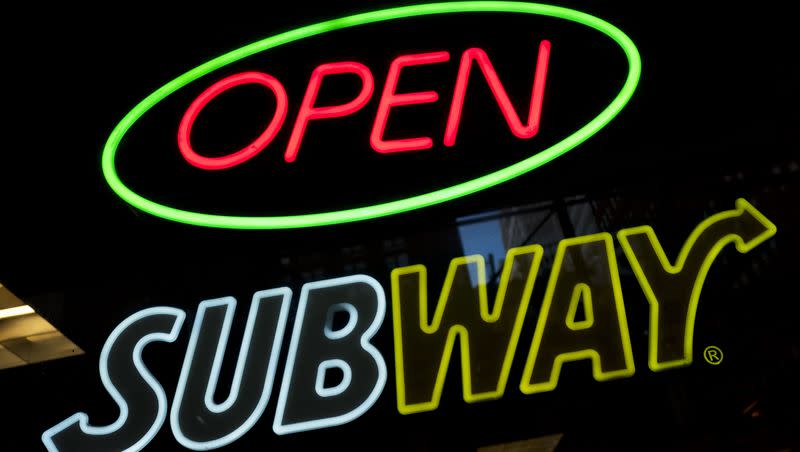Sen. Elizabeth Warren ready for war with Subway

Sen. Elizabeth Warren praised the Federal Trade Commission for investigating whether Subway being bought by a private equity firm “creates a sandwich shop monopoly.”
“We don’t need another private equity deal that could lead to higher food prices for consumers,” said Warren, D-Mass., on X, formerly known as Twitter.
In August, Subway announced it was selling the nearly 60-year-old family-owned business for $9.6 billion to Roark Capital, which has investments in well-known sandwich chains like Jimmy John’s and McAlister’s Deli.
The private equity firm also has Arby’s, Auntie Anne’s Buffalo Wild Wings, and Sonic in its portfolio full of more than 60 investments.
Texas GOP Sen. Ted Cruz pushed back on Warren’s assessment of the acquisition, saying “It’s embarrassing she used to be a Harvard Law professor.”
“‘Sandwich shop monopoly.’ These are words that do not exist in law or in economics,” he posted on X.
What will change if Subway sells to a private equity firm?
If the Atlanta-based private equity firm is successful in acquiring Subway, it will exist as a separate entity within the larger portfolio. But it must first undergo the FTC’s 30-day review, mandatory for mergers over $111.4 million, as Politico reported.
“This transaction reflects Subway’s long-term growth potential, and the substantial value of our brand and our franchisees around the world,” Subway CEO John Chidsey said at the time.
When asked if Subway will remain the same, the Subway CEO told CNBC News in an interview: “I don’t think you’ll see any changes.”
“The great thing about franchising is franchisees set their own pricing and consumers visit all kinds of quick service restaurant brands,” he said.
“They don’t just focus on one brand,” Chidsey added. The CEO also said he didn’t expect any issues with federal regulators.
QSR Magazine, which is geared toward the quick-service restaurant industry, ranked Subway as the largest sandwich chain in the U.S. in a 2023 report. It’s worth noting that the chain has roughly 37,000 locations in more than 100 countries. Roark Capital’s two sandwich corporations — Jimmy John’s and McAlister’s Deli — also landed in the top seven on the list.
In fact, Subway has considered Jimmy John’s, McAlister’s Deli and Schlotzky’s, another entity under Roark Capital, as its competition, according to a franchise agreement from 2021 obtained by the New York Post.
FTC chair’s lack of wins over mergers earns glares from GOP lawmakers
Warren’s preference for an investigation isn’t surprising. Last year, she strongly opposed the $24.6 billion between Kroger and Albertsons, as well as Amazon’s proposed $1.65 billion acquisition of iRobot, which earned her the title of an antitrust hawk.
“The FTC’s job is to investigate potentially anticompetitive mergers and to bring enforcement against those that they deem to be anticompetitive,” Jorge Contreras, a professor and the director of the program on intellectual property and technology law at the University of Utah’s S.J. Quinney College of Law, told the Deseret News.
“So far, it seems that they’re just doing their job in relation to the sandwich merger.”
Subway and Roark have not issued a comment on the FTC investigation.
The FTC is currently headed by chair Lina Khan, who hasn’t shied away from thoroughly reviewing acquisitions. Her agency is appealing Microsoft’s acquisition of Activision in court. It is also prosecuting the Amazon-iRobot merger while considering taking the Kroger-Albertsons merger to court.
Unlike Warren, some GOP lawmakers have argued that the FTC under the Biden administration and under Khan’s leadership has gone rogue and become partisan, especially after one of the commissioners resigned in February over an alleged “abuse of government power.”
At a House Judiciary Committee hearing in mid-July, Republicans accused Khan, a Democrat, of wasting federal funds to pursue legal action against mergers, only to be unsuccessful in preventing one.
“I believe you’ve taken the idea that companies should have to be less competitive in order to merge, (and) that every merger has to be somehow bad for the company and good for the consumer — a standard that cannot be met,” said Rep. Darrell Issa, R-Calif., as The Guardian reported.
Could Mom-and-pop shops struggle under a sandwich monopoly?
Of Subway being in hot water, Contreras said he sees nothing wrong with the investigation if the facts justify it.
He admitted that he doesn’t know the workings of the sandwich market “but it strikes me that if all the major sandwich shops are owned by the same holding company, it may, indeed, lessen competition and thus raise consumer prices in the long run.”
The legal scholar noted that this specific market has a low barrier to entry, which means that if prices rise too much, new competitors, like mom-and-pop shops or foreign companies like Pret A Manger, can bring down the rates.
“It’s probably most difficult for mom-and-pop shops to compete on price in this market, given economies of scale in terms of supplies (everything from napkins to ham), but they can certainly do so in terms of quality,” he said, admitting that he hasn’t eaten at any of the above mentioned chain restaurants in decades because of the superior products at local dining spots.
It will be a while before the FTC can determine whether “Big Sandwich” is a real problem or not. Until then, Subway can’t move forward with the deal, nor can it exacerbate any foot-long industrial complex.

